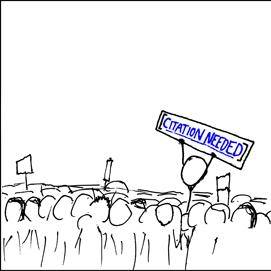It’s a
fact of the human condition that we all really love it when we’re right. I do,
you do, we all do.
I
imagine a lot of people involved in scepticism thoroughly enjoy watching those
videos in which James Rhandi blows some unfortunate psychic or telepath out the
water with a healthy dose of scientific method. You also can’t deny there’s a
certain kick to explaining to someone what cold reading is or how that guy who
runs around wishing desperately he was a Ghostbuster is living in a fantasy
world.
Unfortunately
this love can often get in the way of proper scepticism if you let it.
Lately
there’s been quite a lot of posts over at /r/skeptic throwing around the
phrases like “hey guys, let’s debunk this crackpot theory”, or “can you help me
debunk this viewpoint?” Now, a lot of what these guys are requesting ‘debunked’
are indeed steaming crocks of pseudoscientific shite that deserve all the scorn
thrown their way, but that’s not the point I’m trying to make here.
My point
is that scepticism isn’t about being close-minded. Scepticism isn’t about
attempting to debunk every claim that you encounter.
Scepticism is about attempting to take the scientific method and apply it to
things you encounter during your bizarre trip through this thing we call life.
That means trying to take a fair and unbiased view to whatever you might be
looking into, weighing up the evidence for or against and coming to a rational
conclusion based upon this. When you set out to debunk something, you’re
weighing into an issue with a pre-conceived notion of dismissal; you’ve already
decided you don’t buy this shit, and now you’re out to prove why.
Now, you
could indeed be right; it could be complete shit. Shit entirely lacking credibility, with no evidence to back it up. But if you’re coming in with the
express intention of trying to prove it wrong, you’re little better than the
nutter who completely buys the shit. What’s more, entering into a debate about
these matters with such biases can actually damage your argument; you’re more
likely to grab for evidence that supports your case, even if that evidence
isn’t the most sound there is.
The net
result could well be your pre-conceived notions and biases blinding you to the
truth of the matter at hand. There could well be some, or even a lot, of
credibility to whatever you might be discussed. The net result of such an
outcome is that you’re both wrong and you look like a complete tit.
And
another fact about the human species is that most people really don’t like
being made to look like tits.
So
remember, scepticism isn’t about trying to debunk everything, even if from the
outset what you’re looking into seems ridiculous. It’s about taking a rational
approach to looking into claims.
As the
sceptic extraordinaire Joe Nickell puts it:
“In contrast to
many paranormal proponents who are little more than mystery mongerers, or to
some skeptics who call themselves ‘debunkers’, I hold that mysteries should
neither be fostered nor dismissed. Instead, they should be carefully
investigated with a view toward solving them.”[1]


You're absolutely right. (and I know you love being so)
ReplyDeleteFeels good, man.
DeleteWell said. I try to come to situations with a skeptical and honest frame of mind. I want to sniff out the bullshit from life, but not look to "debunk" everything I see. That would seem like a miserable existence to me.
ReplyDeleteMost of my life and most of my encounters do not need debunking. I save that for when I need to make a decision about something. I want to make sure I have looked at everything closely and found any potential flaws that are within my ability to find.
Going around trying to debunk everything would be quite tiresome to me.
Agreed. I can't help but feel that a lot of the people who want to go off debunking things aren't being sceptics; they're being close-minded.
DeleteRadical skepticism which claims that nothing can be proven has never been my cup of tea anyway.
ReplyDeleteThe problem with radical scepticism is that once you start to take it too far the whole thing starts to fall apart; if you're sceptical of everything you have to be sceptical of your own scepticism, and then the whole thing starts to make your head hurt.
DeleteA healthy dose of scepticism, however, is never a bad thing.